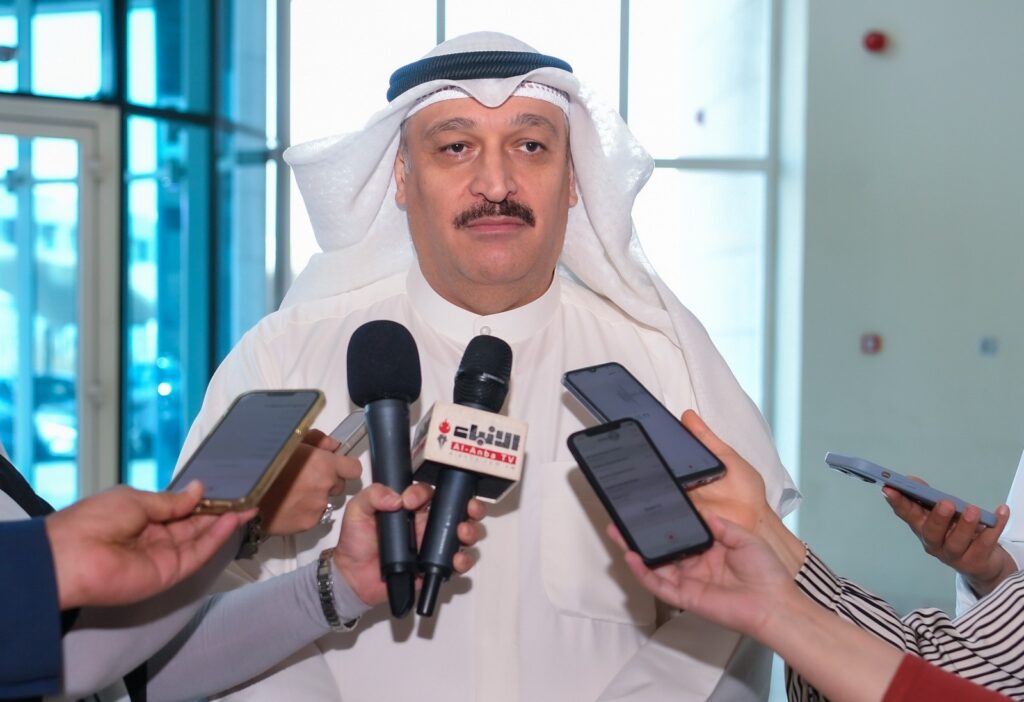12/10/2023
12/10/2023

KUWAIT CITY, Oct 12: The Minister of Health Dr. Ahmad Al-Awadhi affirmed that the progression of penalties for the private medical sector is not the responsibility of the ministry, but rather follows the Medical Liability Agency and the independent and impartial specialized committees that are affiliated with many sectors in the country, including the Ministry of Justice, Kuwait University, the Faculty of Medicine, and other bodies.
In response to a question about studying the gradation of penalties for the private medical sector, from Al-Seyassah during a press conference held yesterday morning to celebrate the initial and partial operation of the Food Inspection Laboratory of the Public Authority for Food and Nutrition (PAFN), the minister said, despite his presidency of the Medical Liability Authority, it is an independent body like PAFN.
He stressed that its working mechanism is clear, and it works in accordance with the laws and decrees in force in Kuwait, due to which the Ministry of Health does not interfere with the sanctions and has no role in that aspect.
Regarding the work controls in the private medical sector and the decisions taken by the Ministry of Health in this regard, Dr. Al-Awadhi said, “We are not against the private sector, but rather partners with it. However, we are in favor of organizing work to preserve the health of the people. The medical responsibility apparatus exists according to a law that was voted on. We refer to it for all violations and complaints that we receive, whether they are related to the Ministry of Health or the private sector, from various workers in the medical body from doctors, technicians, health professionals, and others.
The Medical Liability Agency is the body entrusted with investigating all complaints and reports, and it is the one that takes measures in accordance with regulations and laws.
The results of the investigations may conclude that there are no serious violations that do not exceed a warning, and there may be greater violations than that, and the Medical Liability Authority is the one who determines that."
Dr. Al-Awadhi praised the cooperation between government institutions represented by the Ministry of Health and the private medical sector, stressing that it is important and in line with the state’s vision in the development plan (2035).
He highlighted the cooperation between the public and private sectors, explaining that, “From the time I took over work in the ministry almost a year ago, I have undertaken the responsibility and strived to renew and introduce ministerial decisions and protocols regulating work in the private sector in order to make it as easy as possible for large institutions such as hospitals and health centers or small entities such as private clinics and dispensaries. I have also set standards to facilitate procedures by managing medical licenses and seeking to implement the electronic file instead of manual work.”
Regarding the discussions held by the Ministry of Health delegation with the Board of Directors of the University Health Network in Toronto, Canada, Dr. Al-Awadhi said, "The delegation made multiple elaborate visits to some Canadian government institutions", highlighting the past cooperation over the years between the Ministry of Health and some Canadian and even British health institutions, such as Great Ormond Street Hospital.
Regarding the food testing laboratory, Dr. Al-Awadhi expressed his happiness with its operation.
He explained that the laboratory has begun its current phase by examining vegetables, fruits, and eggs as an initial operational phase. It is working 24 hours a day. In the near future, samples of meat, fish, and dairy will be examined until the system for examining foods is completed before they are traded in the local market, and ensuring their suitability for human use. The laboratory is among the largest laboratories in the area among the Gulf Cooperation Council countries.
He expressed appreciation for the efforts of the laboratory workers, and called for further expansion and rapid completion in light of quality assurance.
In addition, Director of PAFN Dr. Reem Al-Fulaij applauded the cooperation between the laboratory administration, the imported food administration, and the inspection departments in all governorates.
She said the laboratory includes 32 laboratories divided between chemistry and microbiology so that vegetables and fruits are examined by microbiology section, and meat separately in a manner that each laboratory is completely isolated from the other.
Dr. Al-Fulaij said, "The matter that is a source of pride is that the laboratory workers are young Kuwaiti talents with high qualifications", adding that the laboratory was received from the Kuwait Municipality and is gradually being operated according to the availability of equipment.
By Marwa Al-Bahrawi
Al-Seyassah/Arab Times Staff


